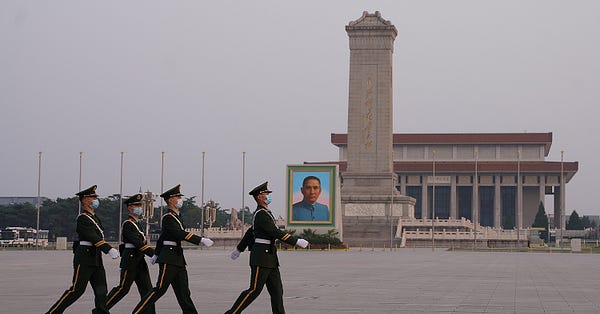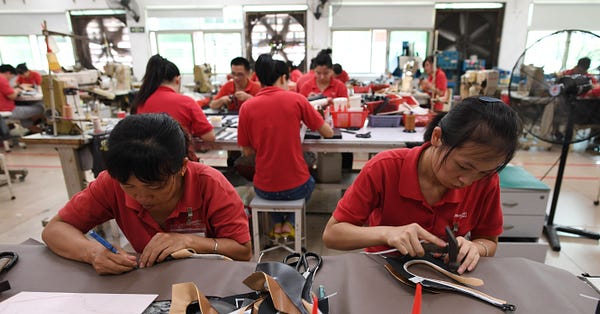Welcome to Trade War, Newsletter 18. Tensions between the U.S. and China continue to rise over the Covid-19 pandemic, with Trump saying that his administration is considering suing China over its handling of the virus. Meanwhile, U.S. officials are pushing the theory that the virus leaked from a lab, but still providing no evidence, with the latest coming from Secretary of State Michael Pompeo.
“I can tell you that there is a significant amount of evidence that this came from that laboratory in Wuhan,” Pompeo said on May 3 on ABC’s “This Week.” “These are not the first times that we’ve had a world exposed to viruses as a result of failures in a Chinese lab.”
China alienated every one of them
While there is far from unanimity on what caused the virus or where it originated, there is a growing tide of unhappiness about China’s assertive - some would say bullying - “Wolf Warrior” style of diplomacy, in countries including Australia, Germany and the United Kingdom, as the New York Times reported in a lengthy piece on May 3.
“You have a new brand of Chinese diplomats who seem to compete with each other to be more radical and eventually insulting to the country where they happen to be posted,” said François Godement, a senior advisor at the Paris-based Institut Montaigne. “They’ve gotten into fights with every northern European country with whom they should have an interest, and they’ve alienated every one of them.”
Between zero and none
The push to get China to pay some kind of financial penalty for its early mishandling of the virus is a non-starter, says analysts. “The chances of getting the Chinese to pay reparations is somewhere between zero and none,” said Scott Kennedy, a senior adviser at the Center for Strategic and International Studies in Washington DC, speaking to the Washington Post.


U.S. growth market for bad policy ideas
A plan under consideration by the U.S. administration to strip China of sovereign immunity to allow suits against it, as well as void U.S. debt obligations to China could backfire, tweets Evan Feigenbaum of the Carnegie Endowment. “It’s a growth market for bad policy ideas but these are two of the worst,” writes Feigenbaum. “The U.S., too, relies on sovereign immunity. And the U.S. also benefits from faith in its debt obligations.”


Trump’s unilateralism
Here’s a good thread from Julian Gewirtz, a historian at Harvard and author of Unlikely Partners: Chinese Reformers, Western Economists, and the Making of Global China. He examines the potential impact of the growing hardline U.S. approach to China, writing “Trump's unilateralism makes it even easier for the CCP to cast U.S. actions as "hegemonic." That's on top of the awful disinformation & propaganda running for weeks now demonizing the U.S.”


Chinese diplomats increasingly undiplomatic
China’s diplomats for their part are proving ever more bellicose. Here’s a piece by Foreign Policy’s James Palmer looking at how Beijing’s ambassadors are taking “an increasingly undiplomatic tone.”


Grim outlook for Chinese consumer spending
An interesting survey by China’s central bank shows that consumers are increasingly pessimistic about their incomes and so are unlikely to spend much, bad news for the Chinese economy. Read this short but illuminating thread by Financial Times reporter Ton Hancock for more on this.


Not operating at normal capacity
One reason for the pessimism no doubt is China’s already bleak jobs situation, with plenty of signs things are going to get worse. Bloomberg’s Jenny Leonard tweets that one influential survey by the China Beige Book suggests the “economy was on less solid ground than official data shows,” noting that factories are reporting that they have reduced their workforces in April.
Buttressing a point that I have been hammering on in interviews—that operation doesn’t mean much unless you look at under what capacity—the survey showed that “while most Chinese companies have returned from the extended shutdown in February, even those that are back are not operating at normal capacity,” reports Bloomberg News. “About 91% of Chinese companies had resumed businesses by late April, according to the CBB survey, but only 4% were operating at full capacity.”

460,000 businesses shut down
The jobs situation is sure to get far worse later this year, reports Aljazeera. The article notes that “more than 460,000 businesses closed, went bankrupt or had operating licenses revoked in the first quarter, including more than 26,000 export-oriented companies,” citing corporate registration database Tianyancha. Meanwhile, new business registrations fell by 29 percent in the same period.
China’s idled workers getting little help
China’s response so far to the unprecedented job losses has been to push new business stimulus measures. The help for idled workers however has been “very limited even though the labour market hit has been substantial,” AFP reports, citing securities house UBS. (More on that phenomenon in an excellent blog post linked to in the Notable/In Depth section below.)


Sad sign of the state of domestic research
In a measure of how sensitive China’s job situation has become the head of research at a Chinese securities house has been removed following a controversial report.
After Zhongtai Securities challenged the government numbers on unemployment writing that real unemployment could be 20.5 percent compared to the widely discounted official figure of 5.9 percent (The official figure does not count China’s some 300 million migrant workers), it apparently faced heavy pressure from the government. It first withdrew the report then shortly afterwards announced its head of research was being replaced, reports Caixin. “Sad sign of domestic research,” tweets You Shu.


Seriously?
As the Trump administration considers putting even more tariffs on China in retaliation for its handling of Covid-19, former Acting Deputy U.S. Trade Representative Wendy Cutler reminds us in a tweet who that will actually hurt. “Seriously? Why would we want to hit our companies, workers, and consumers whom will pay the price at a time when they are hurting already?” she writes.

Supply chains: diversify not reshore
As talk grows about the importance of reshoring supply chains, here is a very well-done commentary by World Bank official Caroline Freund. She looks at what is driving this push, what are the constraints to reshoring, and how much more feasible supply chain diversification is.
“The principle that diversification is the best strategy to reduce financial risk applies with equal force to trade. A better strategy to reduce the risk of potential supply-chain disruption would be for firms to reduce dependence on any individual supplier,” she writes in Barrons on May 1. Definitely worth reading.


Notable/In Depth
If the trend towards protectionism is left unchecked, the world could see a repeat of the 1930s, writes Peterson Institute’s Chad Bown in a commentary in Foreign Affairs.


This blog on understanding China's relatively stingy response to helping its people during Covid-19, is very, very good - Not surprised as its coming from Andrew Batson.


Reform imminent? Not then… not now. In a tweet, Bloomberg’s Peter Martin unearths a CIA assessment of whether China’s reforms could succeed from 1986 — and finds parallels to today.


Missed earlier talks on The Myth of Chinese Capitalism? I will be doing a lecture via zoom on my new book this Tuesday at CSIS. Please tune in if you have the time.




